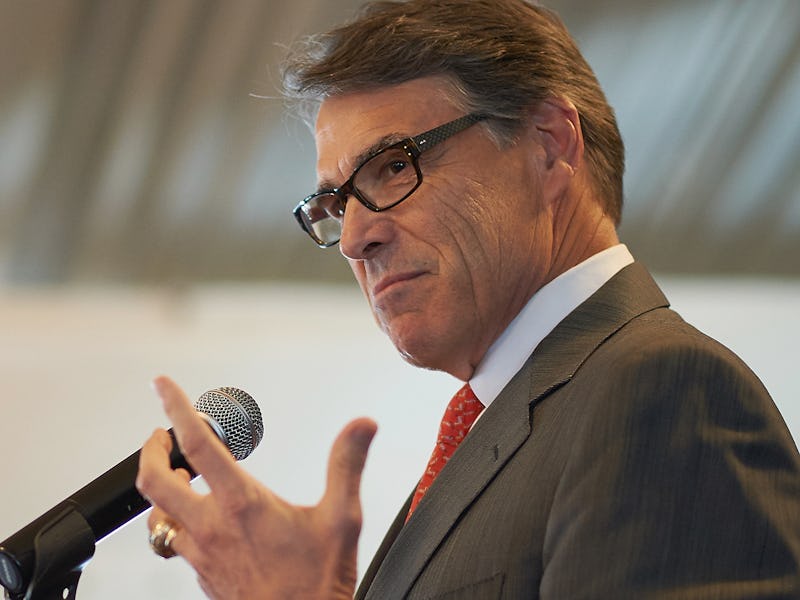Don’t Forget Rick Perry Is Now in Charge of American Physics
Is the Department of Energy going to be safe in Perry's hands? Doubtful.

Scientists are scared as hell for what the incoming Donald Trump administration will mean for science. Former Texas Governor Rick Perry’s appointment as head of the Department of Energy does nothing to assuage those concerns.
Perry, you may recall, once declared during his initial candidacy for president that he wanted to abolish the DOE. The fact that he’s now in charge of something he wanted to once eliminate is not encouraging. But there’s actually more reasons to feel queasy about making Perry the face of physics research in the United States.
For starters, there’s the fact that 40 percent of the DOE’s budget is focused on nuclear weapons. The Trump administration has not made any secret about being woefully undereducated about the nature of nuclear weapons and how they work beyond being available for “the 3 a.m. call.” Trump has also been very vocal about dismantling the Iran Nuclear Deal — despite America’s premier physicists providing clear, scientific arguments for why it works. It doesn’t help that Perry doesn’t really have a physics background — the man has a bachelor’s degree in animal science; Perry’s predecessor, Ernest Moniz, is literally a nuclear physicist.
The worst part of having Perry holding America’s top physics post is that he doesn’t have a clue how to oversee nuclear weapon development and maintenance — worrisome, given that Trump’s plan seems to suggest that the former Dancing With the Stars contestant will have a heavy hand in expanding nuclear arms.
Another 20 percent of the DOE’s budget goes to physics research — more than a dozen different national laboratories around the country and several particle accelerators. Physics doesn’t operate in a vacuum; it’s strongly related to other hard scientific disciplines, including chemistry and environmental research. These all require facts and observations that drive the way we think about the world. That includes climate change — something Perry, like his boss, contends is not a consequence of human action. Perry’s record as governor also includes emphasizing a desire to balance public education of evolution with creationism.
Blatantly rejecting indisputable science — like that of climate change — is a pretty good predictor that Perry will not have much respect for the work of physicists operating under DOE labs. Physicist and cosmologist Lawrence Krauss recalled in a recent New York Times op-ed that Perry once said, “You can violate the laws of physics, but only for a while.” Krauss responded, “Well, actually you can’t.” It’s clear Perry was trying to make something of a point, but the fact that he used a false statement to attempt to make that point is strong proof he has no idea — or respect for — how science works.
Furthermore, a lot of the bright minds who do physics research under the DOE are actively involved in work and organizations that are not in line with the administration’s interests. A recently leaked memo reveals the Trump transition team asked the DOE if it would be willing to disclose names of employees who have been involved in climate change negotiations, along with the professional societies those scientists belong to. The DOE refuses to follow through, but the memo is a clear indication there’s going to be an effort to change the climate and tone of the DOE.
How specifically will this affect physics research? Will it lose funding? Will certain projects become gutted? It’s too early to tell. The fact that Trump wants to bolster nuclear arms development could mean less money for DOE-funded particle research. And if that’s the case, it means many of the scientists currently working at various national labs could jump ship and take their expertise to places in Europe, or even China (which is edging to make itself a physics research powerhouse).
That means if Perry is not careful about his actions as the head of the DOE, he might end up facilitating a brain drain of America’s scientists and boosting the presence of talent overseas. And let’s remember, countries that go through brain drain do not easily recover.
It’s going to be a nerve-wracking four years.